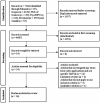Association between problematic TikTok use and mental health: A systematic review and meta-analysis
- PMID: 40697260
- PMCID: PMC12277781
- DOI: 10.3934/publichealth.2025027
Association between problematic TikTok use and mental health: A systematic review and meta-analysis
Abstract
Background: TikTok is a significant part of social media usage, since 25.6% of the total global population has a TikTok account, and, thus, scholars should pay attention to its association with users' mental health.
Objective: To synthesize and evaluate the association between problematic TikTok use and mental health.
Methods: We applied the Preferred Reporting Items for Systematic Reviews and Meta-Analysis guidelines in our review. The review protocol was registered with PROSPERO (CRD42024582054). We searched PubMed, Scopus, Web of Science, PsycINFO, ProQuest, and CINAHL until September 02, 2024.
Results: We identified 16 studies with 15,821 individuals. All studies were cross-sectional and were conducted after 2019. Quality was moderate in 10 studies, good in three studies, and poor in three studies. Our random effects models showed a positive association between TikTok use and depression (β = 0.321, 95% confidence interval: 0.261 to 0.381, p < 0.001, I2 = 78.0%, n = 6 studies), and anxiety (β = 0.406, 95% confidence interval: 0.279 to 0.533, p < 0.001, I2 = 94.8%, n = 4 studies). Data to perform meta-analysis with the other mental health variables were limited. However, our descriptive data showed a positive association between TikTok use and body image issues, poor sleep, anger, distress intolerance, narcissism, and stress.
Conclusion: Our findings suggest that problematic TikTok use has a negative association with several mental health issues. Given the high levels of TikTok use, especially among young adults, our findings are essential to further enhance our understanding of the association between TikTok use and mental health. Finally, there is a need for further studies of better quality to assess the association between problematic TikTok use and mental health in a more valid way.
Keywords: TikTok; addiction; anxiety; depression; mental health; meta-analysis; problematic use; systematic review.
© 2025 the Author(s), licensee AIMS Press.
Conflict of interest statement
Conflict of interest: Petros Galanis is an editorial board member for AIMS Public Health, and he is also a guest editor of AIMS Public Health Special Issue. Polyxeni Mangoulia and Ioannis Moisoglou are guest editors of AIMS Public Health Special Issues. They were not involved in the editorial review or the decision to publish this article. All authors declare that there are no competing interests.
Figures
References
-
- Statista. Social Media & User-generated content. 2024. [cited 2025 February 01]. Available from: https://www.statista.com/statistics/278414/number-of-worldwide-social-ne...
-
- Backlinko. TikTok statistics you need to know. 2024. [cited 2025 February 01]. Available from: https://backlinko.com/tiktok-users.



